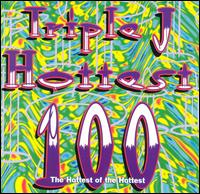
Yesterday, the ABC's national youth radio network Triple J revealed the final results of its listener poll of the Hottest 100 (songs/records) of All Time.
The Hottest 100 brand has become extremely important for Triple J since the poll began in the late 1980s. The annual Hottest 100 CD compilations, which began in 1993, sell by the hundreds of thousands. The annual listener poll for the year's best releases and the accompanying CD and events are a central and vital part of the station's promotion and merchandising.
But the results of this year's poll make disturbing reading for Triple J management and its ultimate masters higher up in the ABC and the Federal Government.
The concern won't be about any individual song or artist - whether a particular song is worthy of inclusion in the best 100 of all time will always be subject to personal taste and passing fads, and will be a subject for robust and enjoyable debate.
But it's the overall picture painted by some basic stats from the Hottest 100 that should have Triple J management worried.
Firstly, only five black artists or acts are represented in the entire Top 100: Michael Jackson (whose recent untimely death no doubt gave him a boost in the poll), Jimi Hendrix, Bob Marley, Stevie Wonder and (maybe) English band Bloc Party (fronted by a man born in the UK to Nigerian parents).
It is inconceivable that any reasonable poll of the "Hottest 100 songs of all time" could so glaringly exclude any and all black artists and music since 1982. This is especially disturbing when one considers how culturally important, if not dominant, essentially black musical forms like soul, funk, hip-hop and R&B have been in Western popular music since the 1960s. Triple J (in)famously began its national broadcasts in 1989 by being the only radio station in the world to play the song "F@#* Tha Police" by NWA (Niggaz With Attitude). Yet there is not a single black hip-hop act in this Hottest 100.
However, far more glaring than the relative lack of black artists is the total absence of female artists.
At best, I can see two songs that even feature female voices - Teardrop by Massive Attack (with "vocals by Elizabeth Fraser", i.e. not a full artist credit) and vocals by Kim Deal on the Pixies' Where is My Mind.
Again, it is utterly inconceivable that any list of the 100 greatest songs of all time could totally exclude female artists.
I know Triple J's own playlist and announcers don't reflect this shocking lack of diversity, and I'm not suggesting an editorial hand at work here. But if you do as I did and Google "greatest 100 songs" (of all time, by genre, by decade, etc.), you'll find all kinds of takes on this - polls, subjective lists, critics' choices. Yet you won't find a single list that completely excludes females and all but the most white-acceptable performers of colour. Indeed, from just some of these lists, and in the space of an hour or two, I easily compiled this list of songs by black and female artists.
Some people - including Triple J on-air personnel - have defended the Hottest 100 over the last 24 hours using what I call "the Logies excuse", i.e. that it's a popularity contest and it's not about merit.
Problem is, Triple J has successfully leveraged its listeners' musical tastes for years in the form of the Hottest 100 brand. And half a million votes sounds like great level of audience engagement. But previous annual polls and compilations have never reflected such an overall narrowness of musical style and audience appeal.
The top 20 especially was dominated by anthemic, epic, heavy, "message" songs in minor keys. And if the singer died tragically and prematurely, the song placed even higher. No "feel good" songs. And definitely no dance.
All of this makes this Hottest 100 of All Time a poison chalice for those whose job is to try to promote the station on the back of it, and for those who would defend Triple J's taxpayer funding on the basis that the national youth broadcaster has an important role in promoting cultural diversity.
Unfortunately, the data suggest that Triple J - intended to break down the sameness associated for so long with commercial Top 40 radio - may simply have subsituted a new kind of (white male) sameness.

4 comments:
Perhaps the most surprising omission is Cannonball by the Breeders. A JJJ classic that was on very high rotation in the mid 90s.
Others not on your list are Grace Jones, Siouxsie and the Banshees and Patti Smith.
As for Tiny Dancer, wtf!?
Let's not forget that Triple J introduced the Hottest 100 some years after Brisbane Community Radio 4ZZZ began broadcasting an annual Hot 100. There are few original ideas in this business but the blazeness of the re-appropriation and the failure ever to acknowledge where they pinched it from always irks me.
I think it reflects the tastes of Triple J's audience well - 18-44 year old males (probably from a middle class background, probably anglo).
Its parent* largely caters to middle class anglos (hey, we rule the world remember?) so surely its just following the corporate line?
The UK's NME found itself in a similar bind. Whilst individual journalists might champion non-white hip hop or dance groups, circulation would drop significantly whenever they put a black artist on the front cover.
*A channel that buys Midsommer Murders but not The Wire - pah!
totally agree Stephen. no soul in that list at all.
to misquote Public Enemy, 'JJJ is a joke in yo town.'
Post a Comment